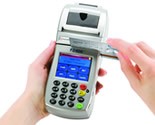4124 College Point Blvd Flushing NY 11355 888-381-7888 Fax 866-593-1060
Understand the Rates and Fees
What is credit card Interchange?
It’s the base cost of a credit card sale.
There are many entities involved whenever you process a credit card transaction. First, there is the acquiring bank, who Dharma represents. Dharma and other MSPs are referred to as Merchant Service Providers. As you will discover merchant services are varied, but the MSP always represents you, the merchant. Secondly, there is the card-issuing bank. The card-issuing bank represents the customer, and is the bank who physically issued the credit card to the customer who’s paying you. The final entity is the credit card association, such as Visa, MasterCard, or Discover. They are responsible for setting the rates at which these transactions process.
What is an Interchange Fee?
For every credit/debit card that exists, there is a pre-set rate that the MSP pays to the issuing bank. This is often referred to as the Interchange rate, credit card Interchange rates or Interchange pricing. You will discover interchange rates correlate with the cost that each bank has for these cards. Typically, cards with more “perks” or “extras” will have higher associated Interchange rates, because the card-issuing bank has additional costs to recoup. (Think rewards, points, or airline miles.) Other cards are very cheap to process, and thus, have lower interchange rates. (Think debit cards – this is essentially taking money from a checking account, and are low-risk transactions for a bank.) Interchange rates will also vary based on how the card is physically accepted – there are lower rates for swiped/dipped sales, and higher interchange rates for keyed/online sales. These Interchange rates apply to all Merchant Service Providers, from the largest providers to the smallest. We all have the same Interchange costs.
So... what are the Interchange rates?
There are hundreds of different Interchange rates. Interchange rates will always have two components: a percentage fee of the volume of the sale, and a per-transaction fee. Typically, the visa mastercard Interchange rate will be written like this:
2.00% + $0.10
The tables are complex, but the important thing to remember when viewing these tables is that every provider is subject to these rates/fees. No matter how big or small, if you want to accept credit cards, you’ll need to abide by
Master card Interchange fees.
Card Association Fees
In addition to Interchange fees that the merchant service provider must pay to the issuing bank, there are fees that are charged by Visa/MasterCard/Discover. There are several different fees that they asses, that are based on many factors, like the amount of volume you process per month, whether or not your customers physically present the card to you, the types of security precautions you take, possible international surcharges, and others. Since many of these fees depend on the circumstance of each transaction, they’re impossible to predict with 100% accuracy. However, the basic fees that the card associations charge are roughly 0.12% of volume, and $0.02 per transaction. Just like the rates that merchant service providers must pay to card-issuing banks, these fees are paid by all providers. It’s what allows smaller providers like Dharma to compete with the larger banks. Card Association Fees represent part of the underlying costs of credit card transactions – the other part being the interchange charge.
Visa Assessments
Visa Fee Pass-Through cost
Pass-Through cost
Credit Assessments 0.13% of credit card volume and $0.0195/transaction. For a $100 credit sale, Visa takes about 15 cents.
0.13% of credit card volume and $0.0195/transaction. For a $100 credit sale, Visa takes about 15 cents.
Debit Assessments 0.11% of debit card volume and $0.0155/transaction. For a $20 debit sale, Visa takes about 4.1 cents.
0.11% of debit card volume and $0.0155/transaction. For a $20 debit sale, Visa takes about 4.1 cents.
FANF Fixed Acquirer Network Fee – Visa charges this flat fee based on how much volume you process per month.
Fixed Acquirer Network Fee – Visa charges this flat fee based on how much volume you process per month.
International Service Assessment Fee Any card you accept from outside the US will be subject to a 0.80% international surcharge from Visa.
Any card you accept from outside the US will be subject to a 0.80% international surcharge from Visa.
International Acquirer Fee This fee applies under identical circumstances as above – there is an additional 0.45% surcharge from Visa.
This fee applies under identical circumstances as above – there is an additional 0.45% surcharge from Visa.
Transaction Integrity Fee (TIF) This $0.10/transaction fee is assessed when a settled debit/prepaid card doesn’t meet CPS requirements – such as submitting AVS info on keyed sales and settling every 24 hours.
This $0.10/transaction fee is assessed when a settled debit/prepaid card doesn’t meet CPS requirements – such as submitting AVS info on keyed sales and settling every 24 hours.
Zero Floor Limit Fee This $0.10/transaction fee is assessed when a settled transaction can’t be linked to a proper authorization.
This $0.10/transaction fee is assessed when a settled transaction can’t be linked to a proper authorization.
Zero Dollar Verification Fee This rarely applied fee of $0.025/transaction applies when cardholder information (AVS, CCV) is verified without authorizing the sale.
This rarely applied fee of $0.025/transaction applies when cardholder information (AVS, CCV) is verified without authorizing the sale.
Misuse of Authorization Fee This $0.045/transaction fee applies to all authorized transactions that do not have a matching settled sale.
This $0.045/transaction fee applies to all authorized transactions that do not have a matching settled sale.
Kilobyte Access Fee This $0.0047/transaction fee is charged for each authorized transaction submitted for settlement.
This $0.0047/transaction fee is charged for each authorized transaction submitted for settlement.
Settlement Network Access Fee This $0.0025/transaction fee is charged for all US-based settled transactions.
This $0.0025/transaction fee is charged for all US-based settled transactions.
MasterCard Assessments
MasterCard Fee Pass-Through cost
Pass-Through cost
Credit/Debit Assessments 0.12% of card volume and $0.0195/transaction for sales under $1,000. For a $100 sale, MasterCard takes about 14 cents.
0.12% of card volume and $0.0195/transaction for sales under $1,000. For a $100 sale, MasterCard takes about 14 cents.
Credit/Debit Assessments 0.13% of card volume and $0.0195/transaction for sales over $1,000. For a $2,000 sale, MasterCard takes about $2.62.
0.13% of card volume and $0.0195/transaction for sales over $1,000. For a $2,000 sale, MasterCard takes about $2.62.
Digital Enablement Fee This fee is 0.01% of volume, and applies on Card-Not-Present sales for commercial cards, consumer credit cards, and signature debit cards.
This fee is 0.01% of volume, and applies on Card-Not-Present sales for commercial cards, consumer credit cards, and signature debit cards.
Cross Border Assessment Fee (Domestic) Any card you accept from outside the US will be subject to a 0.60% international surcharge from MasterCard.
Any card you accept from outside the US will be subject to a 0.60% international surcharge from MasterCard.
Cross Border Assessment Fee (Foreign) Any card you accept from outside the US that is settled in non-US dollars will be subject to a 1.00% international surcharge from MasterCard.
Any card you accept from outside the US that is settled in non-US dollars will be subject to a 1.00% international surcharge from MasterCard.
Acquirer Program Support Fee This 0.85% fee applies to any cards you accept from outside the US, just like the Cross Border Assessment Fee (domestic).
This 0.85% fee applies to any cards you accept from outside the US, just like the Cross Border Assessment Fee (domestic).
AVS Fee (Card-Present) MasterCard assesses a $0.005/transaction fee for using Address Verification Services in a Card-Present environment.
MasterCard assesses a $0.005/transaction fee for using Address Verification Services in a Card-Present environment.
AVS Fee (Card-Not-Present) MasterCard assesses a $0.0075/transaction fee for using Address Verification Services in a Card-Not-Present environment.
MasterCard assesses a $0.0075/transaction fee for using Address Verification Services in a Card-Not-Present environment.
Card Validation Code Fee There is a $0.0025/transaction fee for all transactions that are submitted with the Card Validation Code (also known as Card Code Verification or CCV).
There is a $0.0025/transaction fee for all transactions that are submitted with the Card Validation Code (also known as Card Code Verification or CCV).
Kilobyte Access Fee This $0.00444/transaction fee is charged for each authorized transaction submitted for settlement.
This $0.00444/transaction fee is charged for each authorized transaction submitted for settlement.
Acquirer License Fee This 0.0045% fee is assessed on all processing volume.
This 0.0045% fee is assessed on all processing volume.
Processing Integrity Fee This $0.055/transaction fee is charged when transactions are not settled within 24 hours for Card-Present sales, or 72 hours for Card-Not-Present sales.
This $0.055/transaction fee is charged when transactions are not settled within 24 hours for Card-Present sales, or 72 hours for Card-Not-Present sales.
Account Status Inquiry Fee This rarely applied fee of $0.025/transaction applies when cardholder information (AVS, CCV) is verified without authorizing the sale.
This rarely applied fee of $0.025/transaction applies when cardholder information (AVS, CCV) is verified without authorizing the sale.
Discover Assessments
Discover Fee Pass-Through cost
Pass-Through cost
Credit/Debit Assessments 0.105% of card volume and $0.0185/transaction for all sales. For a $100 sale, Discover takes about 12 cents.
0.105% of card volume and $0.0185/transaction for all sales. For a $100 sale, Discover takes about 12 cents.
International Processing Fee Any card you accept from outside the US will be subject to a 0.40% international surcharge from Discover.
Any card you accept from outside the US will be subject to a 0.40% international surcharge from Discover.
International Service Fee This 0.55% fee applies to any cards you accept from outside the US, just like the International Processing Fee.
This 0.55% fee applies to any cards you accept from outside the US, just like the International Processing Fee.
Network Authorization Fee This $0.025/transaction fee is charged for each authorized transaction submitted for settlement.
This $0.025/transaction fee is charged for each authorized transaction submitted for settlement.
American Express Assessments
AMEX Fee Pass-Through cost
Pass-Through cost
Credit/Debit Assessments 0.15% of card volume is paid directly to American Express. On a $100 sale, this works out to 15 cents.
0.15% of card volume is paid directly to American Express. On a $100 sale, this works out to 15 cents.
Card-Not-Present Surcharge American Express will charge 0.30% of all Card-Not-Present volume
American Express will charge 0.30% of all Card-Not-Present volume
International Assessement This 0.40% fee applies to any cards you accept from outside the US.
This 0.40% fee applies to any cards you accept from outside the US.
What is PCI?
The Payment Card Industry Data Security Standard (PCI DSS) is a set of requirements designed to ensure that ALL companies that process, store or transmit credit card information maintain a secure environment. Essentially any merchant that has a Merchant ID (MID).
The Payment Card Industry Security Standards Council (PCI SSC) was launched on September 7, 2006 to manage the ongoing evolution of the Payment Card Industry (PCI) security standards with focus on improving payment account security throughout the transaction process. The PCI DSS is administered and managed by the PCI SSC (www.pcisecuritystandards.org), an independent body that was created by the major payment card brands (Visa, MasterCard, American Express, Discover and JCB.).
The First Data® TransArmor®
What is The TransArmor Solution?
TransArmor is a dual-layered payment card security solution that combines software- or hardware-based encryption with
tokenization technology. TransArmor secures the transaction from the moment of swipe – prior to transmission and throughout
the payment process - with encryption and prevents card data from entering the merchant’s card data environment (CDE) by
replacing the primary account number (PAN) with a random-number token.
How Does TransArmor Work?
firstdata.com
1. Consumer presents card to merchant
2. Card Data is encrypted and transmitted to First
Data front-end
3. First Data front-end decrypts the data payload
4. Card data is sent to issuing bank for authorization
and, in parallel, tokenized
5. Token is paired with authorization response and
sent back to the merchant
6. Merchant stores token instead of card data
in their environment and uses token for all
subsequent business processes
Why Comply with PCI Security Standards?
Why should you, as a merchant, comply with the PCI Security Standards? At first glance, especially if you are a smaller organization, it may seem like a lot of effort, and confusing to boot. But not only is compliance becoming increasingly important, it may not be the headache you expected.
Compliance with data security standards can bring major benefits to businesses of all sizes, while failure to comply can have serious and long-term negative consequences. Here are some reasons why.
Compliance with the PCI DSS means that your systems are secure, and customers can trust you with their sensitive payment card information:
Trust means your customers have confidence in doing business with you
Confident customers are more likely to be repeat customers, and to recommend you to others
Compliance improves your reputation with acquirers and payment brands -- the partners you need in order to do business
Compliance is an ongoing process, not a one-time event. It helps prevent security breaches and theft of payment card data, not just today, but in the future:
As data compromise becomes ever more sophisticated, it becomes ever more difficult for an individual merchant to stay ahead of the threats
The PCI Security Standards Council is constantly working to monitor threats and improve the industry’s means of dealing with them, through enhancements to PCI Security Standards and by the training of security professionals
When you stay compliant, you are part of the solution – a united, global response to fighting payment card data compromise
Compliance has indirect benefits as well:
Through your efforts to comply with PCI Security Standards, you’ll likely be better prepared to comply with other regulations as they come along, such as HIPAA, SOX, etc.
You’ll have a basis for a corporate security strategy
You will likely identify ways to improve the efficiency of your IT infrastructure
But if you are not compliant, it could be disastrous:
Compromised data negatively affects consumers, merchants, and financial institutions
Just one incident can severely damage your reputation and your ability to conduct business effectively, far into the future
Account data breaches can lead to catastrophic loss of sales, relationships and standing in your community, and depressed share price if yours is a public company
Possible negative consequences also include:
Lawsuits
Insurance claims
Cancelled accounts
Payment card issuer fines
Government fines
You’ve worked hard to build your business – make sure you secure your success by securing your customers’ payment card data. Your customers depend on you to keep their information safe – repay their trust with compliance to the PCI Security Standards.





